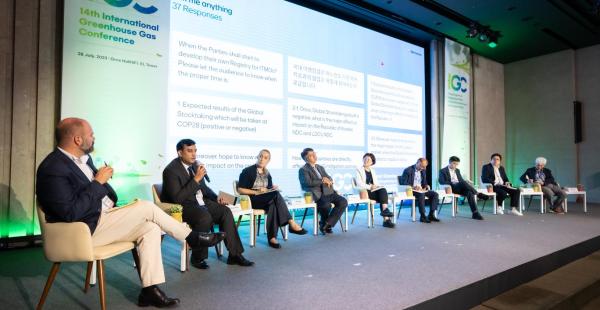
The Global Stocktake under the Paris Agreement and the Enhanced Transparency Framework: Insights from the 14th International Greenhouse Gas Conference
The 14th International Greenhouse Gas Conference (IGC) organized by the Greenhouse Gas Inventory and Research Center (GIR) held in Seoul, South Korea, on July 28, 2023, brought together policymakers, scientists, and stakeholders from the country and from around the world to discuss the critical nexus of tracking progress and enhancing ambition in the fight against climate change.
The Partnership on Transparency in the Paris Agreement (PATPA) contributed mainly with a keynote address on the Global Stocktake, including a brief description of the three main elements of the GST (compilation of information, technical assessment and consideration of outputs) and an outlook of the discussion to be held in the run up and at COP28 in the United Arab Emirates in November/December 2023. The presentation can be accessed on the right under the downloads section.
The workshop was attended by an estimated 196 participants, including the trainees of the 13th UNFCCC-GIR-CASTT (professional four-week intensive training programme on greenhouse gas (GHG) inventories for national experts from developing countries) and representatives from different Ministries, governmental agencies and departments, and academics, who were all involved with or are key stakeholders for climate action in South Korea.
A central theme of this conference was the Global Stocktake under the Paris Agreement, its interplay with the Enhanced Transparency Framework and the capacity constraints, gaps and needs (developing) countries are facing to transition to this new transparency framework.
The Paris Agreement, adopted in 2015, defines three main goals that countries, collectively, are to achieve. These goals are related to achieving net zero emissions by the middle of the century as to limit global temperature increase; enhance adaptation to the impacts of climate change; and align global financial flows with these climate goals. A pivotal component of this agreement is the Global Stocktake, designed to assess the collective progress of countries in meeting their climate commitments, commonly known as Nationally Determined Contributions (NDCs). The stocktake is conducted every five years to assess the collective progress towards achieving the purpose and the long-term goals of the Paris Agreement (Art. 14) and to enhance each country’s ambition, informing the next round of NDCs.
One of the key takeaways from the conference was the recognition of the symbiotic relationship between the Global Stocktake and the Enhanced Transparency Framework. Nonetheless, despite the crucial role the Enhanced Transparency Framework will play in future Global Stocktakes, this first exercise is being completed before the first Biennial Transparency Reports are due for submission (2024). For this exercise, data from national reports being produced under the Convention (National Communications, Biennial Update Reports from developing countries and Biennial Reports from developed countries) are being used. While these reports have not been conceived to specifically provide information on progress towards and achievement of Nationally Determined Contributions, they do provide significant amounts of relevant information related to climate action and financial flows.
National reports, however, are only one of the agreed sources of information which have been considered in the technical dialogues. These other sources of information include reports from, Parties; the Intergovernmental Panel on Climate Change (IPCC); the Subsidiary bodies; Constituted bodies; UN agencies; (voluntary) Submissions from Parties and non-Party stakeholders; and synthesis reports by the UNFCCC secretariat.
Some of these reports also compile official information from Parties submitted to the UNFCCC or to other organizations (including outside of the United Nations). However, it is not mandatory that these reports reflect official information from countries, thus bringing diversity and different perspectives into the dialogues, including the perspective of non-Party stakeholders, be it environmental, development, gender, indigenous, industry based or other.
This variety of sources of information seeks to ensure that the technical discussions are not biased by having a narrower perspective of the challenges and the solutions, which would necessarily be the case if only national official data were considered.
This variety of sources of information is also important to avoid the Global Stocktake being held hostage to the lack of submission of reports by countries. While it was evident, in the conference, that countries are looking forward to transitioning to the Enhanced Transparency Framework and to submitting their first Biennial Transparency Reports, it is still the case that many developing countries are yet to submit their first Biennial Update Report (under the Convention) and only a handful have been able to meet the biennial periodicity.
Transparency is considered the backbone of the Paris Agreement, as transparency efforts help shape evidence-based national policies, enhance NDCs and support the Global Stocktake process. Hopefully, for the second Global Stocktake (in 2028) at least one Biennial Transparency Report from each country will be available.

